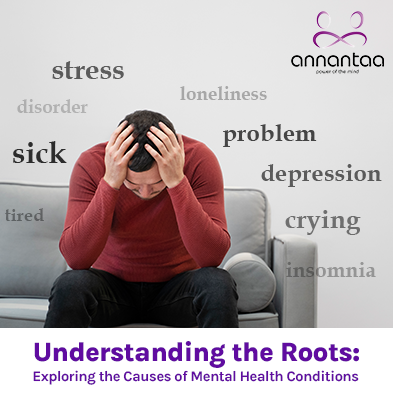
In our day-to-day lives, we experience stress at our workplace due to work overload, compounded by tight deadlines and other responsibilities. Experiencing moments of stress at the workplace can wreak havoc on your well-being, affecting mental clarity and physical health, thus impacting your everyday performance.
Relationship issues can also cause people to suffer from severe mental health issues, leading to severe emotional distress and psychological challenges. The burden intensifies as demands exceed capacity, testing your resilience and emotional well-being. Various such circumstances, whether professional or personal, can lead to significant stress accumulation and eventually lead to an overwhelming level of stress, where you are unable to function. Understanding these stressors empowers individuals to address such situations constructively, fostering personal growth and resilience in the face of adversity.
Stress is any change in the environment that requires the body and mind to adjust and respond in response. Stress is something that we face every day, and is almost an unavoidable part of our lives. Many times stress can be a positive force that helps us overcome challenges, but it becomes negative when a person goes through a cycle of facing continuous challenges without respite or relief. In such cases a person becomes overworked and the stress-related tension builds to a point of no return. Such impact of stress on health can lead to physical problems as well, which over time can lead to chronic stress, which in turn can cause a devastating impact on our health.
The spectrum of its impact ranges from minor annoyances like headaches to life-threatening conditions such as heart disease. Understanding the profound ways in which stress affects our bodies is crucial for taking proactive steps to manage it effectively.
The nature of stress
Stress management is the natural response of the body to different kinds of challenges and threats. When we encounter a stressful situation, our bodies release hormones like adrenaline and cortisol, which prepare us for a “fight and flight” response. This reaction is crucial for survival in dangerous situations. However, when stress becomes chronic, these hormones can cause harm instead of helping us cope.
Immediate effect of stress
- Headaches: One of the most common immediate effects of stress is headaches. Stress causes tension in the muscles of the head and the neck, leading to migraines. These headaches can be debilitating and significantly affect daily functioning.
- Digestive problems: Stress can also disrupt the digestive system, causing symptoms like stomach aches, bloating, and even irritable bowel syndrome (IBS). The gut and brain are closely connected, and stress can lead to an imbalance in gut bacteria, further exacerbating digestive issues.
- Sleep problem: Chronic stress can make it difficult to fall asleep or stay asleep. This lack of quality sleep can lead to a vicious cycle where the body is unable to recuperate, increasing stress levels and further impacting overall health.
Long-term effects of stress
- Cardiovascular health: Chronic stress is a significant risk factor for cardiovascular diseases. It can lead to high blood pressure, increased heart rate, and elevated levels of cholesterol and triglycerides in the bloodstream. Over time, these factors contribute to the development of heart disease, including heart attacks and strokes.
- Suppression of the immune system: Prolonged stress can weaken the immune system, making the body more susceptible to infections and illnesses. This is because cortisol, the primary stress hormone, suppresses the immune response, reducing the ability of the body to fight off pathogens.
- Mental health problems: Chronic stress is deeply related to mental health issues. The constant state of alertness and the imbalance of stress hormones can lead to persistent feelings of hopelessness, worry, and lack of interest in activities you once enjoyed.
- Weight and diabetes: Stress can also lead to weight gain and increase the risk of developing type 2 diabetes. Cortisol promotes the storage of fat, particularly in the abdominal area, that can lead to obesity and insulin resistance.
Managing stress while ensuring better health
Understanding the impact of stress on health is the first step towards managing it effectively. Here are some strategies for reducing and managing stress:
- Exercising regularly: Physical activity is one of the best ways to combat stress. Exercise releases endorphins, which are natural mood lifters, and helps reduce the levels of stress hormones in the body.
- Practice mindfulness and meditation: Mindfulness techniques can help calm the mind and reduce stress. Such practices encourage us to focus on the present moment, which can help reduce anxiety and promote relaxation.
- Healthy diet: Eating a balanced diet can help stabilise mood and energy levels. It is important to incorporate plenty of fruits, vegetables, lean proteins, and whole grains into your diet. Moreover, it is important to avoid excessive caffeine and sugar, which can increase stress levels.
- Adequate sleep: Ensure you get enough sleep every night. Establish a proper sleep pattern that ensures a more relaxing bedtime environment.
- Seeking support: Seeking support is an important pillar on which the ability to deal with stress rests. It is important to talk to family and friends who will understand your problem. Moreover, it is crucial you visit the top psychologist who shall guide you to better manage your stress. Sometimes, just by sharing your concerns, you can alleviate some of the burden.
According to the top psychologist in Kolkata, the impact of stress on health is both profound and far-reaching. By understanding the ways in which stress affects the body and implementing strategies to manage it, individuals can protect their health and improve their overall well-being. Remember, managing stress is not just about reducing its presence but also about enhancing resilience and finding healthy ways to cope with the challenges of life.


